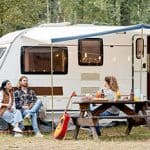
Van camping is very popular, but with the influx of full-timers, people have started to worry about safety issues. After all, being confined in a small van doesn’t seem as secure as a large house with gates, locks, and cameras. However, you might be surprised by the possibilities.
So, is it safe to sleep in a van? Absolutely! By using alarm systems, secure locations, window privacy covers, and other tools, you’ll be able to be as safe as ever when you’re sleeping in your van. Preparation is more important than self-defense knowledge, but both are necessary for peace of mind.
Throughout this post, you’ll find information on how to keep yourself out of dangerous situations by knowing where to park at night, how to create an escape plan, tips for dealing with police encounters, and more.
Safety Concerns of Van Camping
When people think about the dangers of camping or sleeping in a van, the first thing that comes to mind is the lack of security devices at their disposal. When it comes to safety equipment, most vans only have door locks, and a few may have alarm systems. You can significantly improve your odds by reviewing the advice in the security section of the post.
Another concern that people have is the fact that vans are much smaller than a house or an apartment. While you’d be able to flee to different parts of your home in the event of an emergency, vans are quite small in comparison with little room to move.
The biggest advantage that vans have over any stationary building is that they are setting on tires. It seems like a basic concept, but being able to start the engine and drive away is as simple and handy as it gets. In most cases, you’ll be able to escape from potential intruders, animals, and other problems in a matter of seconds.
If you’re stealth camping in town, you might’ve thought about winding up in a bad neighborhood or when camping somewhere out in the wilderness where you haven’t been before. In either case, being unfamiliar with a particular area only adds to the stress someone might feel.
Finally, people often get worried about the idea of having a medical emergency when they’re out of reach. Fortunately, there are many communication devices to get help. The most frequent question is, “What will you do if you get hurt?” To which the answer would be, “exactly what you’d do if you got injured anywhere else.”
Imagine being injured when you’re camping, hanging out at the park, or relaxing on a beach. Most people aren’t carrying a first-aid kit with them everywhere they go, but we all know how to call for help. If you’re genuinely concerned about being alone and injured, then try to stay within an area with good cell reception.
Where to Safely Park in a Van
If you’re a frequent van camper, then you’ve probably already spent many nights at your favorite campground or at some free BLM campsites that are open throughout the year. Whether you’re a van camping pro or novice, the issue is the same. When it comes to sleeping in a vehicle while on a road trip or living in it full time, it’s choosing the safest spot.
If you would like to learn about boondocking, read our post to find out more information on this type of camping.
The best way to delve into the process is by breaking it down between camping locations and inner-city parking.
Parking in the City
Some people prefer to park their van overnight in a city. Before you do this, make sure you research local laws and regulations. After all, it doesn’t matter how safe you are if you’re parking and sleeping illegally. Getting arrested is probably the last thing on your to-do list.
The three areas that people usually choose to sleep in a van around a city are:
- Store parking lots
- Neighborhoods
- Along roads
When you’re sleeping in your van in a parking lot, you need to contact the manager of the store. Walmart, Sam’s Club, and many other major chain stores allow people to park their vehicles overnight. However, there are exceptions, which is why you should call before you show up. Even if you get a few hours of sleep, it’s better than driving while being tired.
Parking in neighborhoods is a risky business unless you contact the people first. Boondocking apps and websites allow you to talk to people around the area, which is a great way to park in someone’s driveway before you hit the road in the morning. Who knows? You might meet new friends along the way.
Roads are great if there are pullouts that allow truckers and travelers to take a rest. Rest stops line the highways around the USA and many other countries. Again, you won’t get a luxurious night of sleep, but you’ll still feel well-rested and ready to go when you wake up. A lot of rest stops and country road stops have an 8-hour parking limit.
Parking Out in Nature
Parking at a campsite is as easy as it gets. You pull up and stop wherever the designated spot is. However, choosing the correct place is a different story. Some people prefer ocean views, while others like to stay secluded in the forest. Whichever you enjoy more, you should consider safety options first.
It’s safe to say that high-cost campgrounds are almost always safer than free camping. This statement is backed up by the fact that most people who pay money to camp most likely don’t want to get involved with situations that can get them kicked out. However, you can have a fantastic time sleeping on free BLM land without paying a dime.
If there aren’t reservations or call lists for a free camping spot, then you should do online research before you head out. Some places are used for hunting and off-road recreational activities, while others are family-oriented. Either way, you’ll rarely find a government-owned property that isn’t well-maintained.
One way to stay safe is to park near lights, benches, campfires, and other amenities that show a person is present in the area. People are much less likely to be threatened if they’re with groups or near other campers. If it’s your first time in an area, try to stay near a group. Also, make your presence known by using the previously mentioned amenities.
Van Safety Features
The forefront of security while sleeping in a van is the safety features that come with it. You can’t protect a vehicle if you’re not doing what it takes to keep it safe. There are several modifications that you make, but without getting too fancy and out of line, let’s examine the five different features that can help keep you safe inside of a van.
Alarm systems are the most apparent addition to vehicle safety, especially when you’re sleeping in it. Some vans come with alarms these days, but if yours doesn’t, you can pay a professional to install one. You can also modify the alarm system to amplify, change tones, and perform other audible actions.
Locks are the front of the security interface. Without a suitable locking mechanism, intruders could walk right into the van unnoticed. Fortunately, every vehicle has locks. If you’re worried about the effectiveness of the locks on your van, schedule a safety inspection with a local mechanic.
Another type of alarm is a smoke detector. Safety isn’t always about stopping other people and animals. Install a smoke alarm in the back corner of your van, preferably on the ceiling since smoke rises. Also, take the extra precaution of purchasing a carbon monoxide alarm as well.
Steering wheel locks serve as an additional line of defense to stop people from stealing your vehicle. Even if you’re inside, intruders don’t always consider whether or not someone might be sleeping. These locks are relatively inexpensive, but many robbers won’t even think about taking a vehicle if they see it in place.
Install an electronic tracking device. Most plug into the OBD port of your van while others can be placed anywhere, hidden under the seat or in any concealed area. While this probably won’t stop the van from being stolen, it will help find its location. One drawback is, there is usually a monthly or yearly fee.
Interior Privacy Suggestions
Part of the safety process involved is making sure that people can’t see inside of the van. Nobody will break into a vehicle if they think that there’s nothing worth stealing. The most crucial bit of information when it comes to privacy is to keep your valuable items out of plain view. Hide stuff underneath seats, bed frames, cabinets, or take the most expensive items with you when you leave the vehicle.
If you want to keep people from looking in, then you should consider window tinting. It’s relatively inexpensive, and there are thousands of tint shops around the country. Every major city is bound to have a handful that can help you keep your items out of view. Make sure that you check the laws and regulations of your area before settling for tint darkness.
Van Camping Life Tip: You can’t tint the front windows and the windshield. Some people still try to, but you’ll end up getting a ticket if you do it. Don’t worry, though. There are a few ways to keep people from seeing through those windows, also.
Window covers are straightforward to make. Some people prefer to buy them online or in-store, but you can make low-cost covers with only a few materials right at home. All you’ll need is:
- Reflectix
- Thin fabric (preferably dark)
- Hot glue
- Command hooks
- Permanent marker
- Knife or scissors
Here’s the step-by-step process to make DIY window covers for your van:
Cut the Reflectix into as many sheets as you have windows. You can even make one for the windshield. Use a marker to outline the area, then cut it into the correct shape and size. It’s better to have too big of a sheet than one that’s too small.
Wrap the sheets in a layer of fabric on all sides. If you want, you can use black on the outside for tint and light color on the inside to brighten the interior atmosphere.
Use hot glue to hold all four corners of the fabric to the sheet of Reflectix. Overlap the fabric to prevent any of the silver material from shining through. Nothing’s more obvious than a bright, shiny silver triangle in the corner of a van’s window.
Mount command hooks onto the four corners of each window, then line them up with the four corners of each window cover that you made. You can either add more hooks to loop them through or simply pierce the fabric to hold each cover in place.
That’s all there is to it. DIY window covers take about 20 minutes to make, but they’re well worth every second. You can remove and replace them instantly, giving you protection from onlookers and sunshine.
Van Camping Life Tip: Mount a curtain rod behind the front seats and put a section of curtains on it to slide open and close whenever you need to. If you don’t want to make extra window covers for the front portion of the vehicle, this is a great replacement. Curtains are also convenient because you can close them when you’re going into a store, hiking, and so on.
Dealing with Law Enforcement
If you’re camping in a van at a designated campsite, then you’ll probably never have to worry about police encounters. However, people who park in neighborhoods and parking lots could eventually wake up to a knock on their door. This situation is so common that it’s known as ‘The Knock’ in the van life community.
Remember that a knock on your door doesn’t mean that you’re in trouble. As long as you’re not doing anything illegal, you’ll only have to deal with a short conversation. The worst possible scenario is that you might have to drive elsewhere.
As mentioned earlier in the post, some Walmart and many other stores allow you to camp overnight. That doesn’t mean that you can pitch a tent and start a campfire, but you can sleep until it’s light outside. Security might knock to see if you’re okay but other than that, you’re entirely within your rights.
If told to leave after explaining the situation, just pack up your items and drive away. There’s no need to get into an argument since you’ll never outwit the police. Hotels, other store parking lots, and nearby campsites should always be on an emergency list if you have to use them. Keep a little money set aside for these scenarios.
There are countless recollections of people getting ‘The Knock,’ being questioned by the police, and then going right back to sleep. If they know why you’re there, then the police probably won’t be upset or ask you to leave. For this reason, among many others, always ask for permission first.
What is Stealth Camping?
Stealth camping is the act of camping in a vehicle without people noticing. For example, you’d probably easily spot a large Class A RV sitting in the middle of a neighborhood. However, a plain van without displaying anything obvious might go unseen throughout the night. The goal of stealth camping isn’t to park illegally, but it’s to avoid people from asking questions.
The unfortunate truth is that most vans are white. Unless you purchased a customized paint job or you have a camper van customize in a shop, you probably will end up with a white van. White stands out in the night more than any other color. However, there are a few procedures that you can follow to stealth camp like a pro.
Turn off all of the lights inside of your van before it gets dark outside. You don’t want to be a lighthouse in the middle of a dark neighborhood. Even if there are streetlights, you don’t want to attract attention to yourself. Speaking of which, park far away from streetlights, so you’re not highlighted.
Cover all of the windows inside of your vehicle to prevent people who pass by from seeing you. Nothing is more obvious than a bed, refrigerator, or a set of open curtains. Do yourself a favor and close up shop before the sun goes down.
Don’t make too much noise. Stereo systems, alarm clocks, phone calls, pets, and other loud sounds will bring attention to your van right away. Remember, the keyword here is ‘stealth,’ which entails silence and camouflage.
Avoid parking in front of driveways, mailboxes, fire hydrants, and other places that people typically walk by. People are much more likely to notice you if you’re sleeping right by them when they’re getting their mail. This rule also applies to parking lot sleeping. Don’t park near donation boxes, light poles, or groups of vehicles.
Finally, and perhaps the most important stealth tip of all, arrive after it gets dark and leave before it gets light outside. Most people are inside for the night once the sun goes down, but they wake up and go to work when it comes up. Do your best to find the sweet spot in between those hours. On most days, you can get a solid 6 to 8 hours of sleep by following this method.
Other Posts of Interest:
• Why We Bought A Yeti Cooler
• What Is A Pie Iron?
• 11 Camping Destinations In The Allegheny National Forest
Create an Emergency Plan
Although it’s nice to think that you’ll never have to use it, an emergency plan can save you from harmful or uncomfortable situations. The three components of a plan include the following:
- Escape plans
- Communication devices
- Protection
Making an Escape Plan
Before you go anywhere, whether it’s a parking lot of a Walmart store or a luxurious campground, you should make an escape plan. Remember that you’re not trying to outrun intruders, but prevent any sort of disaster. Floods, fires, bears, and many other harmful events can occur when you’re sleeping in a van.
Make an escape plan by finding all of the roads in and out of an area. Also, locate any water sources in the event of an emergency. You should always know where you need to go if anything ever goes wrong. For the best convenience, face your van towards the closest exit. If the need arises in the middle of the night, you can hop into the driver’s seat and drive away immediately.
Choosing Communication Devices
Almost everyone has a cellphone these days. With expanding reception regions, it’s unlikely that you won’t be able to get a cell signal. However, there are millions of acres throughout the USA and Canada that don’t have reception. The good news is that you can use walkie talkies almost anywhere. Connect to local channels and call for help. Some of them have emergency contact services.
Don’t forget about air horns and whistles, either. Both of these tools can be useful to ward off intruders and animals. They’re also great if you need to get the attention of nearby campers to help you. Flares work for this purpose as well.
How to Protect Yourself
When safety comes to mind, people often think about the best way to fight off any potential intruders. Truthfully, you need to be careful about what you choose because there are many laws and regulations that vary from state to state, so check the regulations wherever you intend on camping.
The best item to have for your defense when sleeping in a van is pepper spray. You won’t do any long-lasting harm to the person or animal, but it’ll be more than enough to render them nearly harmless. Most pepper spray cans recommend that you face the nozzle within 30 inches of the attacker’s eyes before you spray.
At the time of writing this post, pepper spray is legal in all states; however, there may be certain restrictions in some cities, municipalities, and certain buildings.
Van Camping Life Tip: Don’t use pepper spray inside of the van. If you do, open all of the vents and windows to maximize airflow. Also, don’t make the mistake of using bear spray inside of a vehicle. Bear spray is for stopping a 500+ pound bear in its tracks, so it’ll make you quite miserable for quite awhile.
Mechanical Safety
One of the most forgotten parts of van safety is the mechanical side of it. People often forget that vehicles can cause severe problems, even when the engine is off. If you notice that there’s a leak underneath your van, get it looked at before it gets worse.
Try to make a morning routine that starts with you looking under the vehicle, pop the hood, look for oil leaks and wet spots. Look around for any loose wires or dangling cables. Check to see if the pressure in the tires is low. These simple checkups can detect small problems before they become large ones.
Even if you’re not the best at mechanical parts, you can learn quite a bit by working your way through problems. Traveling in a van means that you’re bound to face some difficulties eventually. As long as you stay near small towns and cities, you’ll have mechanics nearby to take a look and help you out.
As a final note on mechanical safety when it comes to sleeping, make sure that you don’t turn on the alarm of your vehicle if triggered by motion. You don’t want to wake up in the middle of the night to a blaring horn just because you rolled over in your sleep. Locks are usually more than enough security, but feel free to contact the alarm manufacturer to review your options.
If you’re not convinced that sleeping in a parking lot or boondocking is for you, then we have a post about choosing the right campground that will provide you with more information.
Conclusion
Sleeping in a van shouldn’t make you worry about every little noise in the night. You can’t prepare for every situation, but following some of the suggestions throughout this post should help. Remember, as mentioned several times throughout the post, planning is always the first step to safety. If you don’t get yourself into risky situations, you won’t have to deal with the consequences.
This post contains the following advice:
- The best time to make an escape plan is right when you arrive at a campground, neighborhood, or parking lot that you intend to sleep in with your van.
- Protect yourself by using pepper spray as a last resort.
- By using locks, alarm systems, steering wheel locks, you can make your vehicle safer.
- Stealth camping allows you to expand your camping horizons without bringing attention to your van.
- Mechanical safety is just as important as any other security measure.
- Window tint, DIY covers, and curtains are all great tools to prevent people from looking into your van when you’re sleeping. They also act as insulators.
- Always keep a few additional parking spots in mind when you’re parking in a lot or a neighborhood, even if you have permission.






